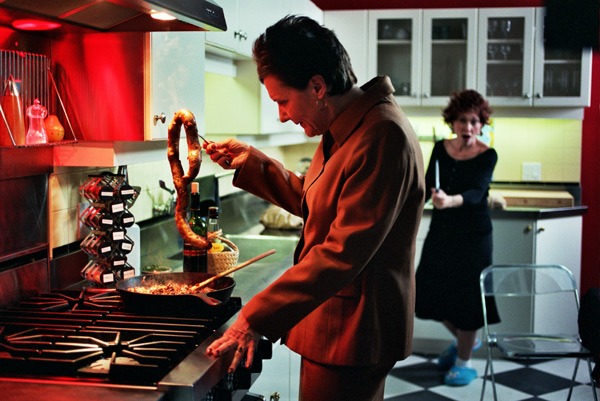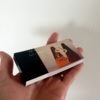
Acting | Company/Organization Profiles
The Guy Next Door
Written by Barbara Diggs | Posted by: Anonymous
Everything Ann Marie Fleming writes comes true. The award-winning filmmaker learned this unsettling fact about herself after making The French Guy, a farcical horror film, showing at the Boston Underground Film Festival this month. While penning the script, she believed that her story was all fiction, written purely on a whim. It was only when she’d finished filming that she realized the gruesome tale’s all-too-real foundation: "At the 2003 Toronto International Film Festival, I was presenting a documentary on my great-grandfather, The Magical Life of Long Tack Sam. I was awakened one night by the sound of a Chinese couple fighting in the hotel room next door. They were visitors, just as I was a visitor. Even though the fight escalated, I did not call the police. What I did not understand until the next day was that I had heard him kill her."
The French Guy turns out to be an eerie example of the subconscious at work. The film’s main character, Elizabeth Murray, is a middle-aged mom who has come home from a brain operation with violent allergies and impulses that are even more violent. As bewildered family and friends look on, Elizabeth frenetically wraps her entire apartment in plastic to stave off allergens, reaches out to a suicidal vagabond, and then declares him to be the love of her life. When a kiss with her new love goes oh-so-very wrong, she loses the last shreds of self-control, and the film morphs into a funny yet creepy burlesque of Psycho, complete with frenzied stabbing scenes and screeching violins. The titular character of the French guy comes in as Elizabeth’s next door neighbor. He listens to the thumps and screams coming from the other side of the wall, but chooses not to interfere, content to imagine what might be happening. Is he hearing ecstasy or pain? What should he do? What will he do?
Fleming’s surprise at seeing her Toronto experience represented in The French Guy was likely compounded by the fact that, she had — for a change — firmly intended not to write about her life. Ever since her first film in 1987, Fleming has made a career largely out of exploring personal and family history.
Born in Okinawa, Japan to Chinese and Australian parents, Fleming has spent most of her life in Vancouver, B.C. She recalls receiving her first camera at age eight, making Super 8 films at 10, and performing radio and video plays at 12. But she never truly considered becoming a filmmaker until much later when she saw A Zed and 2 Noughts by Peter Greenaway and Family Viewing by Atom Egoyan. Says Fleming: "[Greenaway’s film] had all these images in it that had been floating around in my dreams. And Family Viewing… was like having a very interesting conversation with someone about very dark things in our lives." But the matter was settled when Fleming was a student at Emily Carr College of Art and Design in the mid-1980s: "I became enamored with some very beautiful animation I saw [there] and thought — I want to do that."
Since then, she has made over 20 films that traverse a variety of genres (including animated, experimental, documentary and dramatic), and that often revolve around themes of family, history and memory. She is probably best known for her boundary-breaking, award-winning documentary, The Magical Life of Long Tack Sam (2003), which delves into the life of her great-grandfather, a once world-famous Chinese magician and acrobat. Making this documentary, which Fleming describes as "the hardest thing I’ve ever done," was an exhausting journey in which she spent several years immersing herself in the foreign world of magic history and acrobatics, and trying to tie together the long-dormant threads of her great-grandfather’s life.
After the long years and all-encompassing intensity it took to create Long Tack Sam, Fleming had the urge to do something completely different. "I wanted to do something visceral," she says, "[something] that grabbed you by the throat, that had nothing to do with me personally. I wanted to surprise myself." A gory horror film seemed just the ticket. Only there was one hitch: "I can’t watch horror films," she confesses.
Enter Henry Pelle, the male alter ego Fleming created to write The French Guy. "It was easy to write once I created Henry Pelle," says Fleming, "The story points were there, but Henry helped to flesh it all out." In Fleming’s mind, Henry Pelle was a seminal figure in the avant garde video scene in the 1970s, known for his ground-breaking work on male sexuality, but who secretly wanted to do a genre film with a female protagonist. The French Guy was the perfect project for him. Fleming was delighted with the efforts of her second self: "[The film] is much more bawdy, violent and funny than what I could have written. I’m too sensitive."
Too sensitive? This is a film that opens with a close-up of a bloody wound being stitched and involves (hide your eyes) a tongue dismemberment. Can an alter ego — even a very strongly developed one — really go so far in protecting the conscious self? Apparently not. Fleming admits that even with Henry Pelle as a shield, making this film pushed her to her limits: "It was scary writing it! It was awful shooting it! It was unwatchable editing it! The only time I can watch it is in front of an audience. Then, I think it’s funny."
Luckily for Fleming, it only took 10 days to shoot the 85-minute film. "It’s shot in DV-CAM. Isn’t it beautiful? I had a relatively small budget and a very, very small shooting schedule and I needed to be able to set up quickly and move around. We ended up using primarily a steadicam because we didn’t have time to set up shot." Time was definitely of the essence as the film was shot in Fleming’s apartment, and her neighbors, unlike the French guy, were not particularly curious about the mayhem and ruckus occurring next door. They were just annoyed.
But the annoyances of her neighbors were the least of her concerns. Just as shooting began, Fleming lost her production company as well as the infrastructure and financing that went with it. In order to keep the cameras rolling, she quickly refinanced her apartment (which she is now selling to pay off her debts), and managed to keep the upheaval from affecting the cast and crew.
So will Henry Pelle make a reappearance in the future? Not any time soon. Fleming’s next projects go back to her roots. She is making a graphic novel of The Magical Life of Long Tack Sam, a short on an eco-tourism disaster she experienced, and remaking a female version of Hamlet as "a sweeping period drama" of her family’s history. And beyond that — who knows? "Not all my ideas are films," says Fleming, "I’d like to stage an opera…contribute to world peace. I’m at a remarkable point of flux in my life right now." But whatever lies in store for her, she’s not worried. The talented Ann Marie Fleming knows that she can write her own future — and it’ll come true.
For more information about the Boston Underground Film Festival, visit www.bostonunderground.org. For more information on The French Guy, visit www.thefrenchguymovie.com.









